You’re a lawyer, knee-deep in case law and legal documents. Your inbox is overflowing with client emails needing your urgent attention. And then there’s the contract management – drafting, reviewing… it seems endless.
You sigh heavily as you gaze at the towering stack of paperwork on your desk. If only there was a way to get some help without breaching confidentiality or outsourcing sensitive tasks…
Then one day, while sipping your morning coffee and scanning through recent legal developments online, you stumble upon something that makes you sit up straight: ChatGPT for lawyers.
In a world where information is key and good communication is paramount, ChatGPT has emerged as a powerful ally for legal professionals. Imagine having a virtual assistant at your fingertips, ready to assist you with legal research, draft documents, and even simulate client interactions.
Sounds intriguing, doesn’t it?
In this blog post, we’ll delve into the exciting realm of ChatGPT for lawyers and explore how it’s reshaping the legal landscape by offering efficiency, accuracy, and a touch of futurism.
So, whether you’re a seasoned attorney, a law student gearing up for the future, or simply curious about the intersection of law and artificial intelligence, you’re in for a treat. Let’s embark on this journey together and uncover the endless possibilities that ChatGPT brings to the legal table.
Table Of Contents:
- ChatGPT for Lawyers and Its Role in the Legal Field
- Why is AI Good for Law Firms?
- Beyond Just Words: 5 Practical Applications of ChatGPT for Lawyers
- Crafting Effective Prompts for ChatGPT for Lawyers
- Safeguarding Confidentiality in the Age of AI
- Case Study – When ChatGPT for Lawyers Goes Wrong
- The Future of ChatGPT in Law
- FAQs – ChatGPT for Lawyers
- Conclusion
ChatGPT for Lawyers and Its Role in the Legal Field
According to a Thomson Reuters Institute report, a measly 3% of law firms have integrated generative AI or ChatGPT into their operations. An additional 2% have expressed active plans to incorporate this cutting-edge technology.
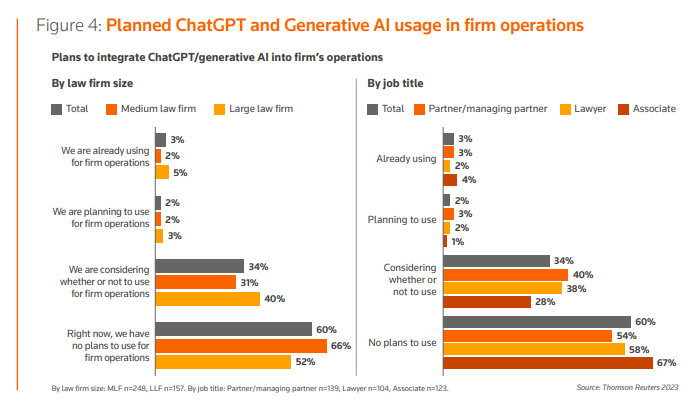
About 34% of respondents are still contemplating the idea of utilizing generative AI, indicating a growing interest in exploring its potential benefits. However, a significant 60% of law firms stated that they currently have no plans to implement generative AI.
If you’re in the camp of “still contemplating” or “planning to use” — or even if you’re already starting to use ChatGPT or generative AI in your operations — this guide will help you augment your work safely. You might even find yourself at an advantage over those firms that are refusing to adapt to changing technology.
Why is AI Good for Law Firms?
AI and ChatGPT are generally good for law firms — as long as they’re used responsibly.
Always keep these key points in mind when you adapt AI to your legal practice:
- ChatGPT is still under development, so it is important to review its output carefully before using it in any real-world applications.
- ChatGPT is not a replacement for human lawyers. ChatGPT should be used as a tool to assist lawyers, not to replace them.
- It is important to use ChatGPT ethically and responsibly. ChatGPT should not be used to generate misleading or deceptive information.
With these ChatGPT limitations out of the way, here are some of the reasons why you should consider adopting AI like ChatGPT into your law firm’s operations.
Boost Efficiency
Unquestionably, the primary boon of AI in the legal arena is its unparalleled speed. In a world where every six-minute increment is accounted for, AI revolutionizes legal work by transforming tasks that once took hours or days into mere seconds.
Time-intensive yet vital activities like research, document drafting and review, and data entry can now be accomplished in a fraction of the time it took before artificial intelligence stepped in. By automating routine tasks, legal professionals can redirect their efforts toward higher-level, strategic work that directly benefits their clients.
Improve Client Services
AI technology like ChatGPT can help law firms improve their client service by providing clients with immediate access to information and by answering their questions in a timely and comprehensive manner. ChatGPT can also help law firms create personalized communications for their clients.
Most people looking for legal assistance need it right now, and they will often choose the law firm that responds the fastest. Integrating an AI chatbot on your website enables instant responses to common client queries, which can improve the user experience.
Ensure Consistent Work
Legal work is undeniably intricate. AI tools come to the rescue by aiding in the development of best practices across law firms.
Predictive workflows provided by AI can guide your teams, ensuring consistency and efficiency in the delivery of legal services. With these tools in place, law firms can navigate complexity with confidence, delivering top-notch service to their clients.
Beyond Just Words: 5 Practical Applications of ChatGPT for Lawyers
ChatGPT is an advanced AI language model designed to understand and respond intelligently to prompts or questions.
Think of it as a digital legal assistant capable of helping clients out with everything from drafting documents to answering complex questions related to case law.
By offloading these repetitive tasks onto AI platforms like GPT-3, lawyers can save time and focus more on the tasks that need their legal expertise. Whether it’s going through client emails or conducting legal research, AI tools like ChatGPT are proving to be invaluable in a lawyer’s toolkit.
In the next sections, we’ll break down how artificial intelligence can help usher your traditional legal practice into the modern era.
1. Efficient Contract Drafting
The drafting of contracts can be lengthy and require a lot of effort. But thanks to artificial intelligence, you can now significantly streamline this process.
ChatGPT has shown promising capabilities in helping law firms with contract management tasks. Its ability to analyze text and generate responses using machine learning algorithms makes it a useful tool for creating contracts quickly and accurately.
ChatGPT can assist lawyers in drafting various legal documents, including contracts, pleadings, motions, and briefs. You can outline the key points and structure and ChatGPT can generate the initial draft, ensuring proper formatting and legal language. You can then refine and review the document as necessary.
This not only saves valuable time but also ensures consistency in document drafting across your firm’s various cases.
2. Quick Document Review
Beyond just drafting documents, ChatGPT shows immense potential in document review as well – another task known for being painstakingly slow within a legal practice.
Lawyers often need to review lengthy legal documents, such as court decisions, contracts, or legal opinions. ChatGPT can read and summarize these documents, highlighting key points, crucial arguments, and relevant details. This summary can serve as a quick reference for lawyers, saving them time in comprehending complex materials.
An important aspect of this is natural language processing which enables a chatbot to understand complex questions often encountered during reviews. With ChatGPT, lawyers now have a helping hand capable of analyzing thousands of pages swiftly while maintaining high levels of accuracy — something even seasoned professionals might struggle with when pressed for time.
3. Legal Research and Case Analysis
Picture this: you have a mountain of legal cases to analyze.
A daunting task, right?
But what if you had an advanced AI tool at your disposal?
The beauty of using AI for case analysis lies in its efficiency. Leveraging the power of machine learning algorithms embedded within large language models such as ChatGPT allows you to sift through vast amounts of data in a short period.
ChatGPT also comes in clutch for tedious legal research — especially if you use GPT-4 and hook into the internet.
In fact, legal research is one of the top uses for AI-driven tech in the legal field.
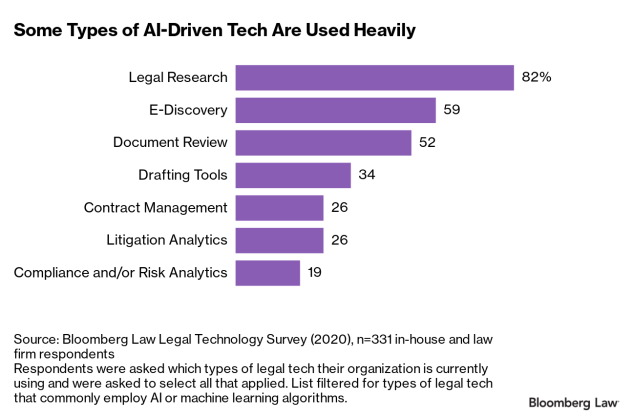
On top of that, you can provide specific legal queries and ChatGPT can generate relevant case summaries, statutes, or legal principles to aid your research process.
By feeding ChatGPT with open-ended questions related to a specific legal topic, it can draw out key points from mounds of text faster than any human could.
Digging deeper into specifics isn’t an issue either.
For instance, you can ask ChatGPT to summarize a judge’s key points in a particular case and the AI will generate succinct summaries without breaking a sweat.
ChatGPT can conduct in-depth legal research on specific topics, statutes, case laws, and regulations. It can provide lawyers with relevant and up-to-date information, saving them time and effort in digging through extensive legal databases.
But remember, as with any AI tool, it’s crucial to be aware of a chatbot’s limitations. Always cross-check for accuracy and consult legal professionals when necessary. After all, no tool is perfect and mistakes can occur – even in an advanced system like ChatGPT.
4. Legal Writing Assistance
When working on legal briefs, memos, or articles, lawyers can use ChatGPT to brainstorm ideas, outline arguments, or generate introductory and concluding paragraphs. It can serve as a valuable writing assistant for content creation, providing suggestions and improving the overall structure of the document.
ChatGPT can also help lawyers refine their written work by identifying grammatical errors, inconsistencies, and unclear sentences. It can offer suggestions to improve sentence structure, coherence, and overall readability, ensuring that legal documents are polished and professional.
Another area where ChatGPT can be useful is formatting citations according to specific styles (such as Bluebook or APA). Lawyers can provide the necessary details, and ChatGPT can generate properly formatted citations for references and footnotes in legal documents.
You can also use ChatGPT to create customizable legal writing templates for common documents like contracts, wills, or legal opinions. Just input specific details and ChatGPT will generate tailored templates, ensuring consistency and accuracy in legal document creation.
Legal jargon can be complex and challenging for clients to understand. ChatGPT can help simplify legal language, making legal documents more accessible to clients without compromising the legal integrity of the content.
By leveraging ChatGPT’s capabilities in these areas, lawyers can enhance their legal writing processes, improve the quality of their work, and ultimately provide more effective representation for their clients.
However, it’s important to exercise professional judgment and review the output provided by ChatGPT to ensure accuracy and adherence to legal standards.
5. Improved Client Communication and Support
Client communication is essential in the legal field, but it can be challenging to keep up, especially with complex legal issues and a high volume of client emails. AI offers a promising solution, with advanced technologies like ChatGPT streamlining client interactions and saving lawyers’ time when writing emails.
ChatGPT can manage routine client communications, drafting polite and professional responses to common inquiries, scheduling requests, and other administrative tasks. This saves time and ensures consistent communication.
ChatGPT is more than a simple chatbot. It can understand open-ended client questions and generate comprehensive responses based on a vast database of case law. This improves efficiency and client satisfaction, as clients receive quick replies to their ChatGPT prompts.
ChatGPT’s machine learning algorithms analyze text inputs and generate appropriate outputs, enabling it to handle even intricate queries without breaching confidentiality rules.
AI platforms use natural language processing (NLP) to interpret prompts accurately. This is a major advantage in the context-sensitive legal field, where meanings often depend on specific word choices.
Many in-house legal teams use AI tools to maintain high professional standards in all communications while providing faster response times.
In addition to handling routine tasks like answering FAQs and summarizing long documents, AI bots can keep busy lawyers updated on recent developments in their specialization areas without requiring hours of manual research.
Despite all this, it’s important to remember that AI tools are not meant to replace lawyers. They are supportive technologies designed to make lawyers’ lives easier and give them more time to focus on what matters most: providing expert advice based on their deep understanding of the law and unique insights.
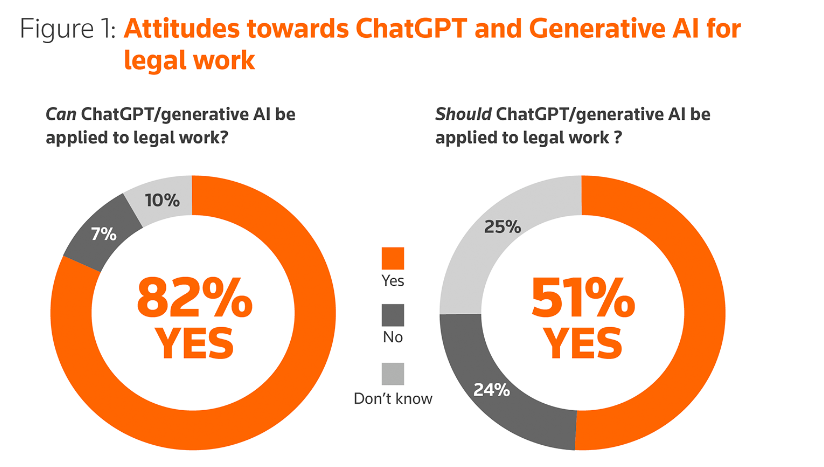
Source: Thomson Reuters
Crafting Effective Prompts for ChatGPT for Lawyers
The effectiveness of a chatbot depends on your ability to craft relevant prompts. Here are a few tips on how to master prompting for legal topics.
- Be Specific: Provide clear and specific prompts. The more precise your instructions, the more accurate the response will be. For legal research, specify the jurisdiction, relevant statutes, and any specific case details you need information about.
- Break Down Complex Questions: If you have a multifaceted question, break it down into smaller parts. This helps ChatGPT understand each component, providing more focused and accurate responses.
- Include Context: Provide relevant background information to set the context. Explain the purpose of your query and any related details that can help ChatGPT generate a more tailored response.
- Ask for Sources: If applicable, request that ChatGPT provide the sources of the information it generates. This allows you to verify the accuracy of the information from reputable legal sources.
- Review and Revise: After receiving a response, review it critically. If the answer is not precise or comprehensive, consider rephrasing your question and asking follow-up questions for clarification.
In addition to crafting clear and concise prompts, understanding the limitations of machine learning models such as ChatGPT can save you lots of time trying to write the perfect prompt. Avoid overly intricate requests that might exceed the chatbot’s current capabilities.
Safeguarding Confidentiality in the Age of AI
No conversation about implementing technology in the legal sphere would be complete without discussing confidentiality – the cornerstone of any lawyer-client relationship.
We’re all aware of the gatekeeping role played by law firms when it comes to protecting confidential information; thus incorporating AI tools into any firm’s daily operations should be done carefully.
Breaching confidentiality could have severe consequences not only legally but also reputation-wise — even if done by accident — so tread carefully when embracing new tech.
To be mindful of client confidentiality and ethical obligations, here are some best practices for safeguarding client information.
- Avoid Sharing Sensitive Information: Do not share confidential, proprietary, or sensitive client information with ChatGPT. For instance, while using ChatGPT for reviewing contracts or responding to client emails, it’s crucial to ensure the AI does not have access to sensitive information. Stick to general legal queries or use hypothetical scenarios to illustrate your points without revealing confidential details.
- Follow Encryption Protocols: Ensure that all communication between parties remains private and inaccessible even if intercepted during transmission.
- Use Generic Examples: When seeking assistance related to specific cases, use generic examples or fictional scenarios that do not disclose client identities or sensitive case details.
- Anonymize Information: If you need to discuss a real case for educational purposes, anonymize the information. Change names, locations, and other identifying details to protect client confidentiality.
- Clear Chat Conversations: If you’re using a platform that stores chat history, ensure you regularly clear the conversation history or use platforms that prioritize user privacy.
- Check Platform Security: Use reputable and secure platforms for interacting with ChatGPT. Ensure the platform you’re using employs encryption and other security measures to protect the data exchanged during conversations.
- Educate Your Team: If you work in a law firm, educate your staff about the importance of client confidentiality and the specific protocols for using AI tools like ChatGPT in a secure manner.
- Install Regular Updates: Make sure your AI tools are always up-to-date to fix any potential security flaws.
- Read Terms of Service: Familiarize yourself with the terms of service and privacy policies of the platform hosting ChatGPT. Ensure they have robust data protection measures in place.
Always be cautious of what you’re feeding into an AI system to protect your client’s interests while still reaping the benefits of advanced AI tools.
Case Study – When ChatGPT for Lawyers Goes Wrong
If you’re wondering how ChatGPT fits into the legal field, let’s dive right into a real-world example.
In a landmark decision, U.S. District Judge P. Kevin Castel imposed sanctions on two New York lawyers, Steven Schwartz and Peter LoDuca, after they submitted a legal brief containing six ChatGPT-generated fictitious case citations.
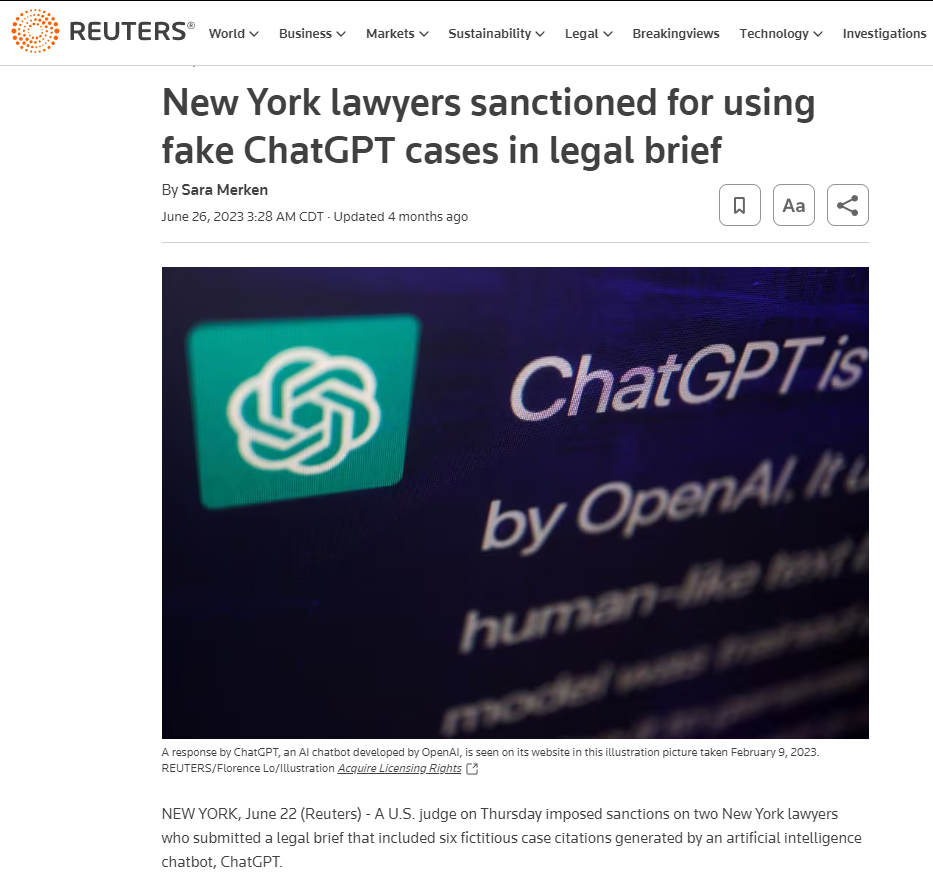
The judge ruled that Schwartz and LoDuca acted in bad faith, engaging in “acts of conscious avoidance and false and misleading statements to the court.”
As a consequence, they were ordered to pay a fine of $5,000.
The case, filed against Columbian airline Avianca, took an unexpected turn when Avianca’s lawyers and the court discovered the fabricated legal references in a March filing.
Schwartz and LoDuca expressed remorse, blaming ChatGPT for misleading them into incorporating non-existent legal research in their court documents.
Schwartz explained he had used ChatGPT to search for legal precedents supporting a client’s case related to an injury on a 2019 flight. The AI tool suggested cases involving aviation mishaps that Schwartz had been unable to find through traditional research methods. However, several of these cases were either nonexistent or involved airlines that weren’t real.
During the proceedings, Judge Castel questioned Schwartz about one invented case that morphed from a wrongful death claim into a bizarre scenario about a man missing a flight.
Castel expressed dismay at the confusion, describing it as “legal gibberish.”
Schwartz apologized profusely, admitting his failure to verify the accuracy of the citations. He assured the court that his law firm had implemented safeguards to prevent similar incidents in the future.
Ronald Minkoff, the attorney representing the law firm, argued that the submission resulted from carelessness rather than bad faith, urging the judge to reconsider sanctions. He emphasized the challenges lawyers face with new technologies, highlighting the difficulty of navigating evolving AI tools.
Legal experts, including Daniel Shin from William & Mary Law School, noted the significance of the case.
Shin emphasized that this incident highlighted the risks of using AI technologies without a full understanding of their capabilities, urging legal professionals to be cautious when employing promising AI tools in their practice.
The case serves as a stark reminder of the complexities involved in integrating artificial intelligence into the legal field, especially in high-stakes cases within federal courts such as the Southern District of New York
The Future of ChatGPT in Law
AI tools, particularly language models like ChatGPT, are reshaping the legal field.
They’re transforming traditional practices into more efficient systems, capable of handling complex tasks with speed and accuracy.
Here’s a glimpse of what the future holds for ChatGPT in the legal field.
Natural Language Interfaces for Legal Software
Future legal software may incorporate ChatGPT-like interfaces, enabling lawyers to interact with complex legal databases using natural language. This user-friendly approach will democratize access to legal information, making it easier for legal professionals and even clients to navigate legal complexities.
Data Analysis and Predictive Analytics
AI technologies allow lawyers to process large volumes of data quickly. They can analyze patterns in case outcomes, enabling predictive analytics.
Lawyers can use these insights to strategize better, assess case viability, and offer informed advice to clients based on historical data trends.
Ethical and Regulatory Compliance
As AI becomes more integrated into legal practice, there will be a need for robust ethical and regulatory frameworks. Legal professionals will need to ensure that AI tools comply with legal ethics, confidentiality, and data protection standards.
Future developments may focus on creating AI systems that align seamlessly with legal professional standards.
Continuous Learning and Skill Development
AI platforms like ChatGPT might offer continuous learning modules, assisting lawyers in staying updated with the latest legal developments, case laws, and regulations. This ongoing education can contribute to the professional growth of legal practitioners.
Collaboration and Knowledge Sharing
AI-powered platforms could facilitate collaboration among legal professionals globally. Lawyers could share knowledge, collaborate on research, and exchange insights, fostering a more connected and knowledgeable legal community.
Personalized Legal Advice and Client Interaction
AI tools could offer personalized legal advice based on specific client queries. By analyzing case histories and legal precedents, these tools can provide tailored suggestions, empowering lawyers to offer more individualized guidance to their clients.
Additionally, AI-driven chatbots could handle routine client interactions, schedule appointments, and provide general legal information.
BrandWell recently introduced a generative AI suite featuring specialized AI Agents to help you craft niche-specific content. One of these “agents” is a startup lawyer.
Here’s the response of “Ethan” when I asked about AI copyright:
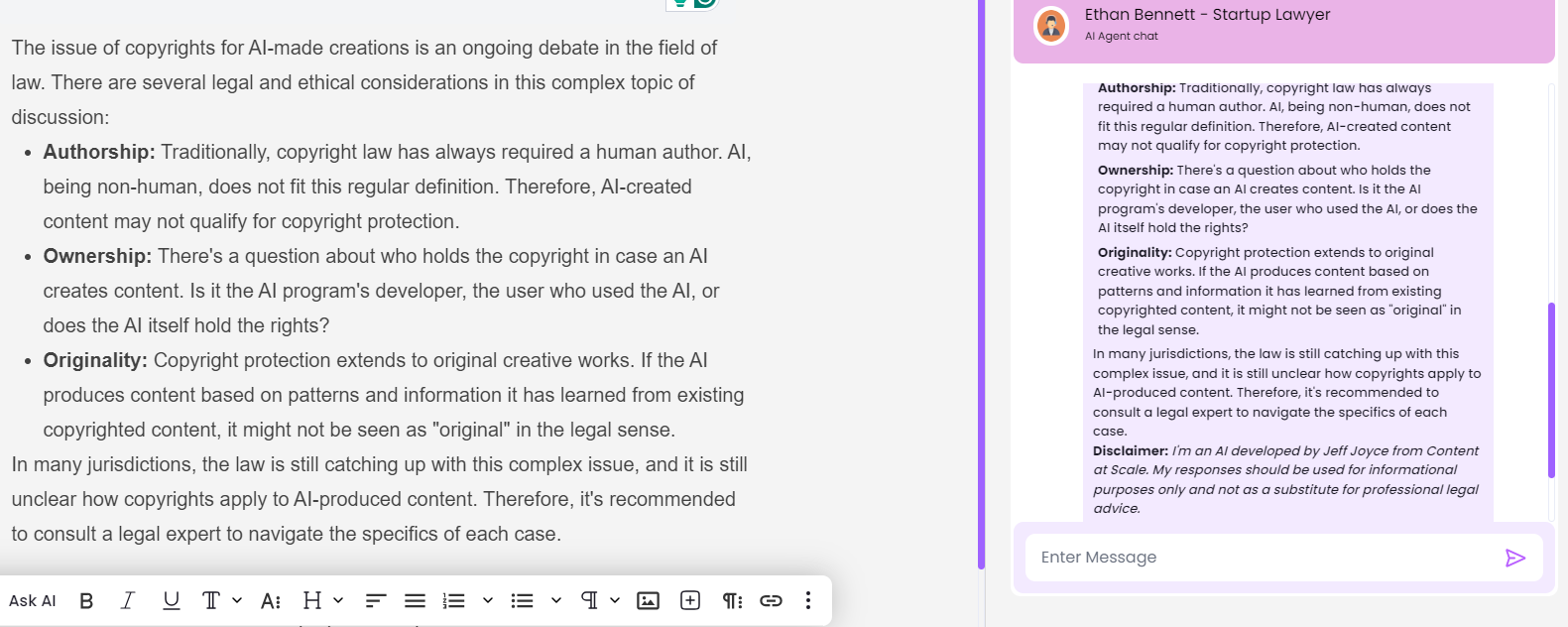
Pretty soon ChatGPT for lawyers will become obsolete as more specialized chatbots like BrandWell‘s AIMEE arrive on the scene.
While the future of ChatGPT in the legal field holds immense promise, legal professionals need to adapt to these advancements thoughtfully. It is imperative to maintain a balance between leveraging AI technologies for efficiency and upholding the core values of the legal profession, such as ethics, integrity, and client confidentiality.
As AI continues to evolve, lawyers embracing these technologies strategically will likely find themselves better equipped to navigate the complexities of modern legal practice.
FAQs – ChatGPT for Lawyers
Can lawyers use ChatGPT?
Yes, lawyers can use ChatGPT. It’s a handy tool for drafting contracts, summarizing cases, and enhancing client communication.
What is the best use of ChatGPT for lawyers?
The best use of ChatGPT for lawyers is in contract drafting and case analysis. This AI tool can streamline these time-consuming tasks efficiently.
How many lawyers use ChatGPT?
An exact number isn’t available, but with over 100 million monthly ChatGPT users worldwide, it’s safe to say that numerous legal professionals are utilizing this advanced technology.
What happens when your lawyer uses ChatGPT?
If your lawyer uses ChatGPT, you might experience faster response times and more efficient service as routine tasks get automated, allowing them to focus on more complex matters.
Conclusion
So, you’ve dived deep into the world of ChatGPT for lawyers. You’ve seen how this AI chatbot can help streamline your legal practice – from document review to conducting research.
The future is here, bringing along potential opportunities as well as challenges in data privacy and system integration costs.
Embracing AI is not about replacing humans but enhancing their capabilities. With tools like ChatGPT, we’re stepping into an era where artificial intelligence supports our work rather than threatening it.
Remember, while ChatGPT can be a valuable tool, it does not replace the expertise and judgment of a qualified attorney. Always use your professional judgment and verify the information obtained through ChatGPT from authoritative legal sources to ensure accuracy and reliability.
Make technology serve you and not define you. Adopt these advancements while staying true to your core principles of justice and fairness.